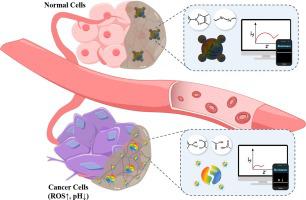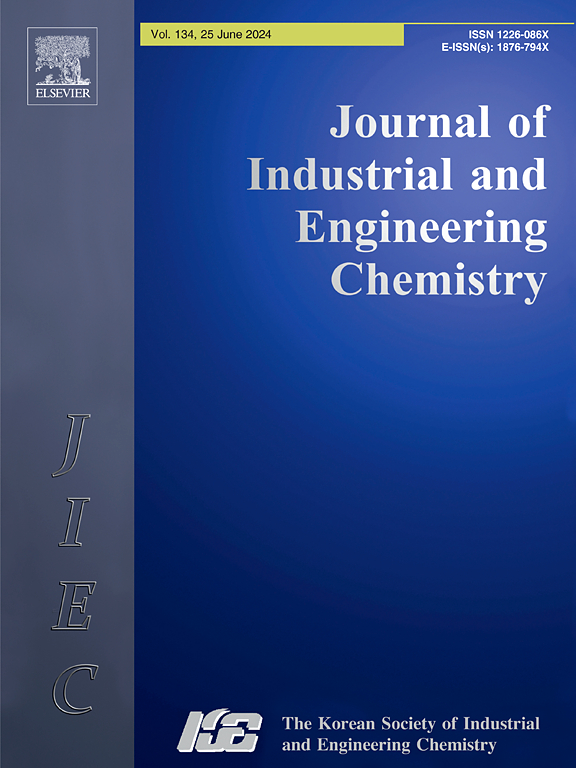Cancer intra and extracellular microenvironment-responsive electrical signal of touchable conductive hydrogel
IF 5.9
3区 工程技术
Q1 CHEMISTRY, MULTIDISCIPLINARY
Journal of Industrial and Engineering Chemistry
Pub Date : 2025-01-25
DOI:10.1016/j.jiec.2024.06.027
引用次数: 0
Abstract
A wireless-integrated tumor microenvironment-responsive sensor designed from diselenide-functionalized carbon dot (dsCD) and hyaluronic acid polymer dot (PD(HA)) loaded in a mineralized conductive hydrogel (dsCD-PD(HA) Hydrogel) for detecting cellular reactive oxygen species (ROS) and pH detection. The manufactured ROS/pH responsive conductive hydrogel efficiently differentiated between cancer cells and normal cells in response to cellular factors through changes in fluorescence, electrical and mechanical response. Tumor microenvironment acidity and high ROS concentrations caused fluorescence recovery via boronate ester and diselenide bond cleavage alongside a change in electrical resistivity from 78.9 kΩ (pH 7.4) to 38.8 kΩ (0.1 mM H2O2/pH 6.8) due to disintegration of molecular interaction in the sensor. In vitro electrochemical analysis revealed different ΔR/R0 bending profiles between cancer (26.2 % and 25.9 % for HeLa and PC-3, respectively) and normal cells (17.9 %), alongside the optical performance demonstrating higher regain of fluorescence of cancer cells (HeLa and PC-3) compared to the normal cells (CHO-K1). Additionally, the dsCD-PD(HA) Hydrogel demonstrated favorable biocompatibility and in vitro ROS scavenging, with selective targeting of cancer cells. A wireless sensing platform was developed by connecting the dsCD-PD(HA) Hydrogel sensor to a smartphone, showing a precise signal during detection via resistance or electro-mechanical signals.


可触摸导电水凝胶的癌症细胞内外微环境响应电信号
一种用于检测细胞活性氧(ROS)和酸碱度(pH)的无线集成肿瘤微环境响应传感器,由负载在矿化导电水凝胶(dsCD-PD(HA) Hydrogel)中的二硒化功能化碳点(dsCD)和透明质酸聚合物点(PD(HA))设计而成。制造出的 ROS/pH 响应型导电水凝胶通过荧光、电和机械响应的变化,有效区分了癌细胞和正常细胞对细胞因素的反应。肿瘤微环境酸度和高浓度 ROS 导致荧光恢复,硼酸酯和二硒化物键断裂,同时由于传感器中分子相互作用的解体,电阻率从 78.9 kΩ(pH 值为 7.4)变为 38.8 kΩ(0.1 mM HO/pH 值为 6.8)。体外电化学分析表明,癌细胞(HeLa 和 PC-3,分别为 26.2% 和 25.9%)和正常细胞(17.9%)的ΔR/R 弯曲曲线不同,同时光学性能也表明,癌细胞(HeLa 和 PC-3)的荧光恢复率高于正常细胞(CHO-K1)。此外,dsCD-PD(HA)水凝胶还具有良好的生物相容性和清除 ROS 的能力,可选择性地靶向癌细胞。通过将dsCD-PD(HA)水凝胶传感器与智能手机连接,开发出了一种无线传感平台,在检测电阻或机电信号时可显示精确的信号。
本文章由计算机程序翻译,如有差异,请以英文原文为准。
求助全文
约1分钟内获得全文
求助全文
来源期刊
CiteScore
10.40
自引率
6.60%
发文量
639
审稿时长
29 days
期刊介绍:
Journal of Industrial and Engineering Chemistry is published monthly in English by the Korean Society of Industrial and Engineering Chemistry. JIEC brings together multidisciplinary interests in one journal and is to disseminate information on all aspects of research and development in industrial and engineering chemistry. Contributions in the form of research articles, short communications, notes and reviews are considered for publication. The editors welcome original contributions that have not been and are not to be published elsewhere. Instruction to authors and a manuscript submissions form are printed at the end of each issue. Bulk reprints of individual articles can be ordered. This publication is partially supported by Korea Research Foundation and the Korean Federation of Science and Technology Societies.

 求助内容:
求助内容: 应助结果提醒方式:
应助结果提醒方式:


